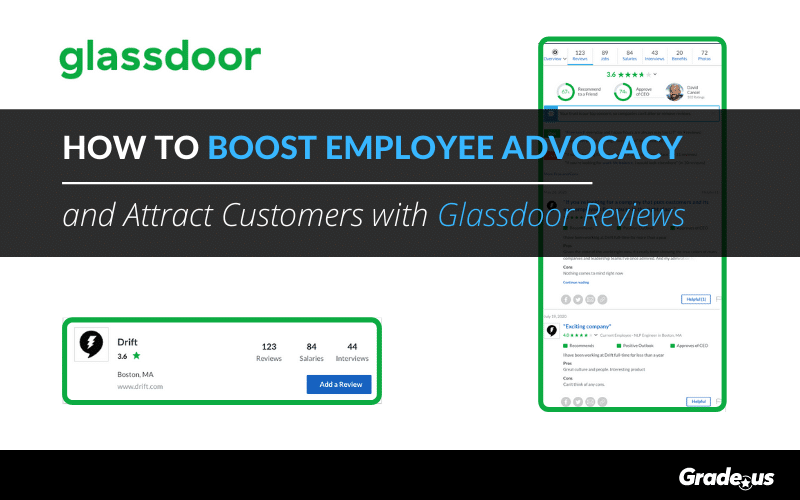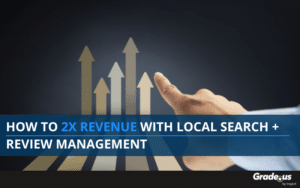Customers are looking at your Glassdoor reviews.
Glassdoor sat down with John-Henry Scherck, a marketing strategist, to figure out why he combs through a company’s Glassdoor profile before deciding to hire them. It’s an unexpected treasure trove of data that offers customers a behind-the-scenes look at the organizations they’re considering.
What do customers like Scherck hope to find?
They’re looking for a detailed breakdown of the company’s values, their quality of work, data on employee turnover, and perceptions about their business. Prospective customers, employees, investors, and competitors — they’re all watching. What is your profile saying?
Table of Contents
Get the Reputation You Deserve with Grade.us
Why Glassdoor is important to your business
It’s something many businesses haven’t caught onto yet.
Glassdoor is a platform people use to get an insider look at the inner workings of your company. While one-off reviews from disgruntled employees can be devastating, the true impact of Glassdoor comes from the trends it reveals.
Employees are quick to out employers who:
- Don't pay on time
- Attempt to game the system with fake reviews
- Provide lower than average pay
- Offer a toxic or dysfunctional work environment
- Deceive customers
- Have poor logistics, fulfillment, or training processes
If there’s a problem in your company that goes unresolved for too long, your employees may eventually go public on Glassdoor.
This has a dramatic effect on employer branding.
LinkedIn’s Employer brand statistics, 72 percent of recruiting leaders worldwide agreed that an employer’s brand has a significant impact on hiring. As an employer, your brand makes it easier to attract, win, and retain A-player candidates.
Employer branding, via employee reviews, produces a:
- 50% increase in qualified candidates
- 50% cost-to-hire reduction
- 1 - 2x faster time-to-hire
- 28% reduction in mis-hire and employee turnover
Here’s why this is so significant for candidates.
Interested, A player candidates don’t know what it’s like to work for the companies under consideration. According to LinkedIn’s report, this is the number one obstacle employees face. What’s the best way to relieve prospective candidate’s fears?
Employer reviews.
According to LinkedIn…
- 75% of job seekers consider an employer's brand before even applying for a job.
- 52% of candidates first seek out (1.) the employer's website, and (2.) their social media profiles to learn more about the employer.
- Candidates trust current employees 3x more than the company to provide credible information on what it's like to work there.
Why does this matter?
Glassdoor researchers Daniel Zhao and Andrew Chamberlain, Ph.D., made an obvious discovery. Happy employees, satisfied customers. This doesn’t seem like a groundbreaking revelation, but it is. Here are some of the key findings from their study:
- Overall, there is a strong connection between better customer and employee satisfaction.
- Each 1-star improvement in an employer's Glassdoor company rating out of 5 is associated with a statistically significant 1.3-point increase in customer satisfaction out of 100.
- Since some employees interact more with customers than others, their satisfaction can more heavily influence customer satisfaction. Glassdoor ratings among customer-facing sales and customer service roles have a strong link to customer satisfaction, regardless of industry.
- The effect is more than twice as large for companies in "high customer contact" sectors where customers routinely interact with employees: Retail, food services, tourism, financial services, and health care.
So to recap what we’ve learned so far:
- Customers, prospective employees, and competitors are all reading your employee reviews to learn more about you.
- Employees are willing to air their employer's dirty laundry if problem areas are unresolved for too long.
- Unhappy employees directly impact the happiness and satisfaction of your customers; the happier your employees, the happier your customers.
This makes Glassdoor an essential component in your business’ online reputation management strategy. It’s importance as a review platform grows as your business grows.
Who uses Glassdoor?
As a review platform, Glassdoor has mainstream appeal. Here’s a brief breakdown of the people who are most active on Glassdoor.
- Recruiters: Professional headhunters who are looking to place with specific firms or recruit new ones.
- Job candidates: People who are looking for a job — this includes both the employed and the unemployed. Employees who are gauging their current position against new options they're considering.
- Employers: Organizations in need of talent; They use Glassdoor for a variety of reasons as well. They compare the strength of their offers against those of their competitors, advertise a new position, pursue temporary or specialty talent, and more.
- Customers: They use Glassdoor as an evaluation tool to compare what their target company is telling them vs. the reality of an employee's behind-the-scenes experience.
- Competitors: Glassdoor is a competitive intelligence tool that provides off the record information that exposes key vulnerabilities they can exploit.
Some additional details about Glassdoor users.
- 92 percent are college-educated
- 44 percent have more than 6 years of work experience
- 58 percent are millennials
Each of these segments approaches Glassdoor with its own goals and objectives. As an employer, you’ll need to work well with each of these groups as they all have an impact on employer branding and the public’s perception of your company.
How Glassdoor compares to other review platforms
Here’s a breakdown showing how Glassdoor compares to other mainstream review platforms.
Glassdoor attracts many visitors, but it’s not quite as large as the big three mainstream review profiles.
This isn’t a problem at all.
That’s because none of the mainstream review platforms address employee/employer reviews. In fact, Glassdoor is well-received, more so than its competitors (e.g., CareerBuilder, LinkedIn, Monster, etc.). With Glassdoor, employees feel comfortable sharing juicy details on their profile.
What your business goals should be on Glassdoor
With other review platforms, you’re primarily focused on a transaction to generate traffic, leads, sales, or revenue. Glassdoor is different in the sense that it’s primarily focused on relationships. Their platform is focused on your relationship with employees and the way you’re perceived in the marketplace.
This is an important distinction.
As far as business goals are concerned, here’s what Glassdoor has to offer.
- Employee candidates: A steady supply of interested candidates via their advertising and enhanced profile offerings. As you probably expect, these candidates will head straight for your reviews, so your review portfolio on Glassdoor needs to be strong.
- An enhanced profile: These offer more than the free Glassdoor profiles most employers have. They allow you to highlight reviews, remove competitor ads from your profile, and more.
- Brand advertising: An advertising campaign that enables you to target job seekers on Glassdoor and across the internet with targeted campaigns.
As far as business goals go, it’s all about finding, attracting, and winning talent.
That’s the priority.
Glassdoor isn’t really focused on anything else. They’re all about building, promoting, and revealing employer/employee relationships on their platform.
How to claim your Glassdoor listing
Claiming your employer listing on Glassdoor is simple and straightforward. Here’s a step-by-step breakdown showing you how to do it.
1. Head over to Glassdoor.com.
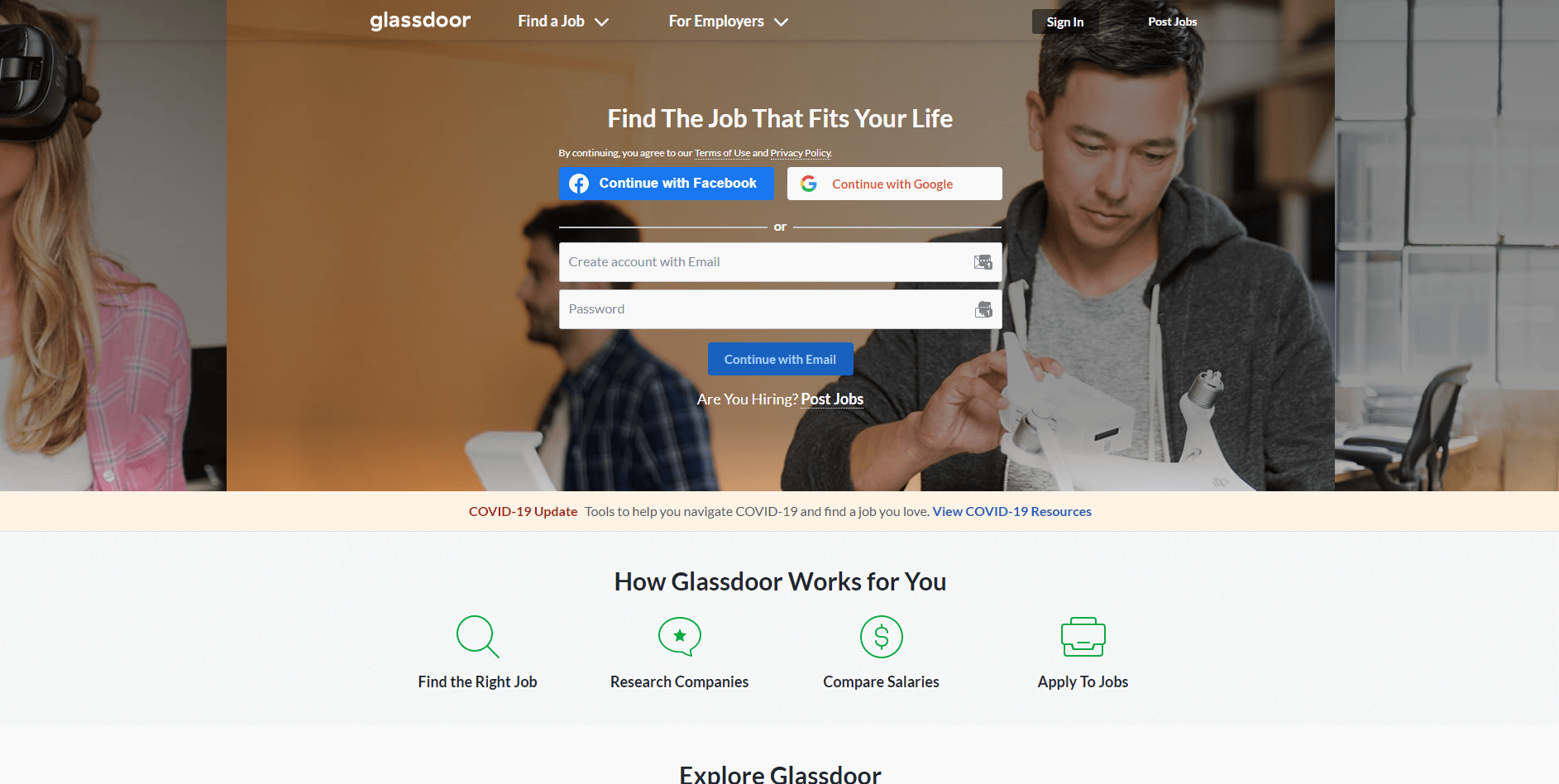
2. In the “For Employers” tab, click “Unlock Employer Account.“
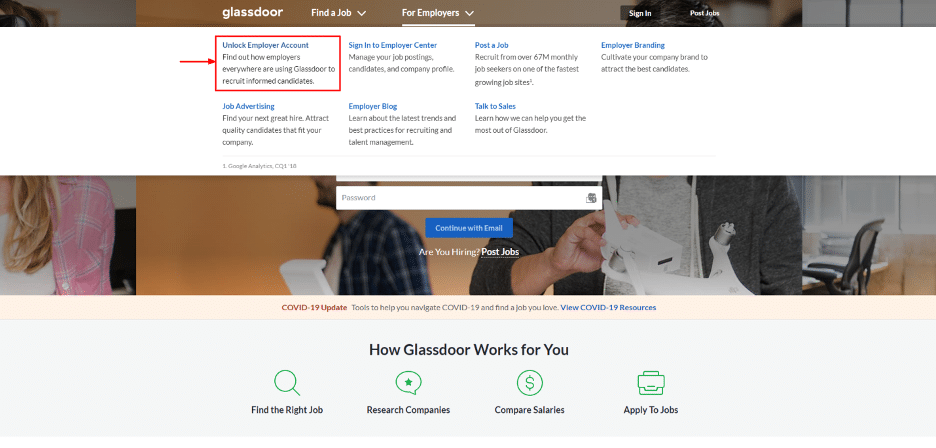
3. Fill out the form, including the number of open jobs account, then click “Create Account.”
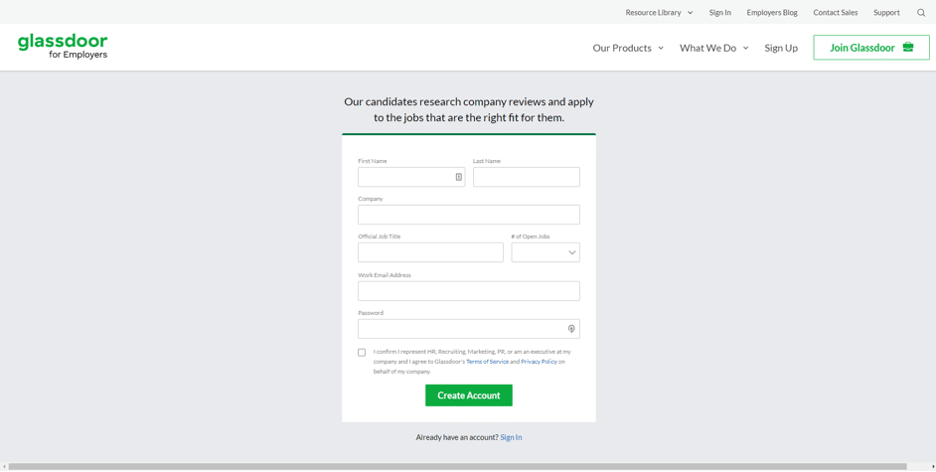
4. Next, tell Glassdoor a bit about your company.
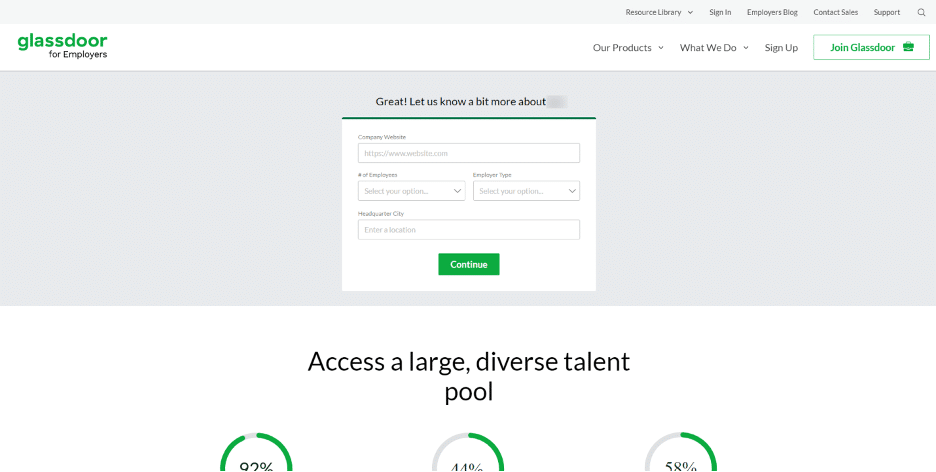
5. Glassdoor will verify your identity and respond via email within 24 hours.
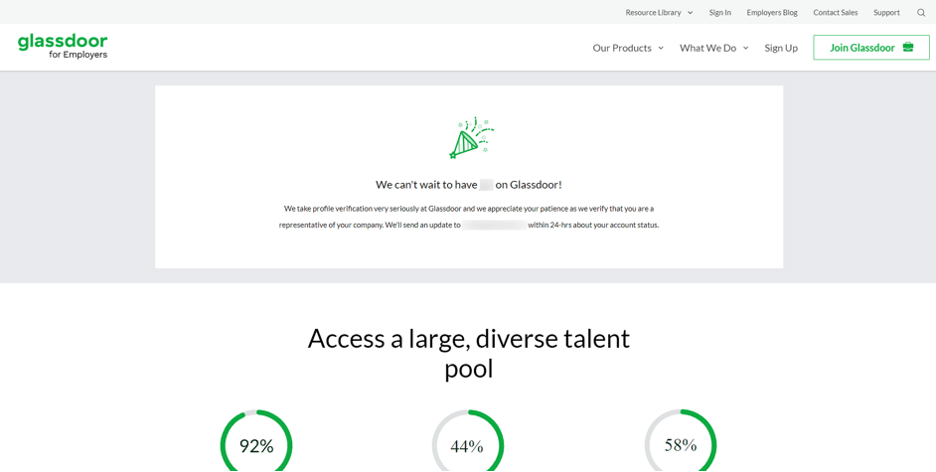
6. Finally, you’ll receive a verification email asking you to activate your account.
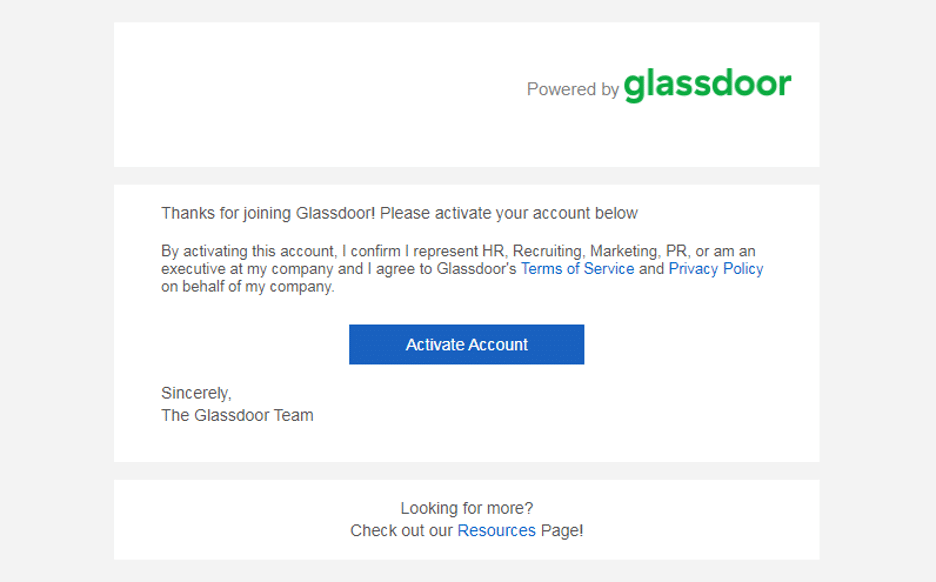
And that’s it!
Once your account is verified, you can respond to employee reviews and manage your brand on Glassdoor.
Asking for Glassdoor reviews
Glassdoor encourages employers to request reviews on their platform. They provide some simple instructions you can use to send reviews out via their platform.
Gathering reviews from employees ensure job seekers are getting current information about your company.
Below are instructions for using your Glassdoor Employer Profile to send an email request for reviews for your company.
1. Go to the Employer Center.
2. Click Employer Guide.
3. Click Request Reviews.
4. Enter your employees’ email addresses in the To field. Send to distribution list or group of employees.
5. Select the Review Type you would like to request.
6. Enter your email address in the From field.
7. In the Message field, invite current employees and recent interviewees to provide honest feedback.
8. Click Preview to review your request.
9. Click Send.
Glassdoor offers something they call their OpenCompany program.
Here’s what it offers.
“Glassdoor’s OpenCompany program recognizes employers that proactively promote and embrace workplace transparency; in turn, letting prospective employees know that they’re committed to workplace transparency. When candidates are checking out your updates, reviews and your open jobs, they’ll see the OpenCompany badge on your profile and know that you’re committed to a culture of transparency.
Think of it like the blue, verified checkmark on Instagram, or Amazon Verified. Career conscious users on Glassdoor see the badge are more likely to trust your company and want to join your ranks. Plus, participation in this program is FREE for any employer who wants to be recognized for embracing transparency!”
Employers will need to complete five requirements to be part of the OpenCompany program. Here’s a direct quote from their program page.
- Update Company Profile
Requirement: Validate your basic company profile information is up-to-date at least once per year.
Why: It’s basic housekeeping. If you don’t pay attention to the basics, candidates may question what you do pay attention to.
- Add Photos
Requirement: Add at least 10 photos per year.
Why: A picture’s worth a thousand words! Photos are a great way to give job seekers a feel for what your office space and corporate culture are like.
- Get Reviews
Requirement: Get at least 60 reviews from current employees per year.
Why: The more current the review, the more weight it has with the job seekers.
- Respond to Reviews
Requirement: Respond to at least 10 reviews per year
Why: Showing that you listen and respond to employee feedback is a cornerstone of transparency.
- Promote Your Profile
Requirement: Place a link on your website (or social media site) to your Glassdoor Company Profile.
Why: Show job seekers that you are open to employee feedback by encouraging them to check out your profile.
All of the requirements are easy to meet, with the exception of item three. Sixty reviews from current employees each year is a big ask if these are all unique employees.
Here’s Glassdoor’s list of what you should and shouldn’t do when it comes to requesting employee Glassdoor reviews.
What you should do:
- Request reviews from all employees so there's no indication of bias; avoid cherry-picking the employees you know are engaged. Give job seekers a balanced view of your company so they're able to make an informed decision. This makes it easier to attract quality reviews in the future.
- Prep your employees ahead of time; tell them that you're planning on asking them to share their feedback via Glassdoor. It's important to prepare employees ahead of time so they don't feel coerced or put on the spot.
- Clarify that reviews are voluntary and anonymous, that you don't know who writes what. You don't want employees to feel coerced, like they have to write a positive review to keep their jobs. Make your requests impersonal, transactional, and somewhat generic.
- Give your team a template or framework they can follow. This could be as simple as giving employees simple questions they can answer, letting them know it's safe to share positive (or negative) details in their review, etc.
What you shouldn't do:
- Once you've requested a review, you can share a reminder. But don't attempt to ask individual employees whether they've written a review or not. That's a big no no, and it goes against Glassdoor's policies.
- Don't ask new employees to write a review; Glassdoor recommends requesting reviews from employees at the 90-day mark or 1 year anniversary. When you think about it, this makes sense. New employees aren't aware of the internal workings of your organization and they aren't fully acclimated to their role within the company.
As with every review platform, you’ll want to avoid dysfunctional, toxic, or negative feedback when employees leave negative feedback. It goes without saying but you’ll want to respond in a healthy way as this shows job seekers that their feedback will be welcome and you provide a safe environment for them.
As employers seek to manage their brand, they need to be aware that many superficial positive reviews are often not enough to win individuals with many career options. The more depth a review has, the more likely it will be taken seriously and used to assess an employment opportunity.
Optimizing your profile and advertising
You’ll need to purchase an enhanced profile if you’d like to optimize your account. It’s a paid service but you’ll need to talk to someone on their sales team to get a price quote. To give you some perspective, the starting price for an enhanced profile was $495 per mo. when their service debuted in 2010.
Here’s what you get with an enhanced profile.
- Feature and respond to employee reviews
- Update basic company info
- Enhance your brand with your own photos and videos
- Monitor your profile traffic
- Understand your candidate demographic
- Discover what other companies’ candidates are looking at
- Target jobs on competitor profiles
- Benchmark your employer brand against competitors’
- Own your profile to protect it from competitor job ads
Once you’ve signed up for an enhanced profile, you can optimize your profile, so you’re able to create what Glassdoor calls the Perfect Glassdoor Profile.

- Post your company logo:Adding your logo to your profile confirms that users are looking at your official Glassdoor profile.
- Add a cover image:Your cover image is additional real estate you can use to promote a message that’s relevant to employees. In our example above, Salesforce uses this to promote an award “2020 Best Places to Work”
- Tell a story with photos:Your photos provide job seekers with a surprising amount of information about the events, causes, and projects your organization supports. It also communicates a lot about the work environment and helps to set job seeker expectations.
- Display your OpenCompany status: Glassdoor’s OpenCompany program is an important must-have that sends an important message about your organization’s transparency. Once complete, you’ll receive a badge you can add to your profile.
- Post Corporate information:Provide job seekers with information outlining your company size, location, industry, values, mission, etc. This basic data gives them important information they need to assess whether they’re a match or not.
- Display open positions:With an enhanced profile, you can add your available positions to your profile directly. This is ideal because it prevents your competitor’s job ads from being displayed on your profile.
- Include affiliate organizations:You can still keep A-player job seekers in your net of potentials if your business isn’t a direct fit. Be sure to list affiliates, parent, and sister companies — this gives employees options they can work with, especially if there are available positions elsewhere.
- Use nested profiles:Segment your content, jobs, and reviews by job function or division, so job seekers get a realistic idea of what it’s like to work in your business. Keep content relevant to each section to maximize impact.
- Share company updates:Share employee wins, company achievements, important news, community service, and philanthropic programs. Give job seekers the validation they need to get a true sense of your organization.
- State your value proposition clearly:Job seekers, like customers, have questions. What makes this company so special, what can I achieve here, and why should I choose them? Share content that answers the question explicitly.
- Share social profiles:Adding your social media handles and embedding a preview of your social feeds gives you the opportunity to build a relationship with job seekers. They may not be a fit now but they could be in the future. Maintaining a connection via social media provides you with the relationship needed to make an offer down the road.
- Highlight reviews: Employee reviews are the soul of your Glassdoor profile — defuse objections, counter inaccurate claims, share factual accounts. Choose reviews that work with the goals and objectives your organization has in mind.
- Be responsive:Responding to reviews shows job seekers, employees, customers, and competitors that you’re listening, you’re open to feedback and you’re looking for ways to improve. Review responses are opportunities to listen, empathize, and support your team.
- Share awards and credentials:Use social proof to win employees over. Your achievements become your employee’s achievements. Sharing awards, accolades, and credentials are a powerful way to give employees a sense of ownership.
- Target your audience:If you have an Enhanced Profile, you can target as many as four different audiences based on their role or occupation (e.g., directors, managers, engineering, or marketing).
Once you’ve verified your employer account on Glassdoor, you can upgrade to an enhanced profile and participate in their branded advertising campaigns. You’ll need to contact sales directly to get more information on each of these programs.
Your Glassdoor point-of-contact
If Glassdoor enhanced profiles and policies have remained the same, employers are assigned a dedicated account manager who’s on hand to answer any questions you may have. If you have a free employer account, you’ll still be able to contact Glassdoor directly via email or phone.
Here are the contact details they provide.
As far as review management platforms go, Glassdoor is highly responsive and willing to help via various channels. Not so with the big three mainstream review platforms.
Goal tracking via Glassdoor
Glassdoor expects transparency, but they also provide that to employers in return. Here’s a detailed (and official) look at Glassdoor analytics for employers.
Their analytics tool isn’t a half-hearted attempt at analysis.
Glassdoor provides a detailed, robust, and comprehensive look for anything relevant to your employer accounts. Competitor comparisons, candidate demographics, and analysis tools make this a better offering than even some of the larger review platforms.
It’s really well done.
Glassdoor reviews are a key brand reputation tool as your company grows
Your Glassdoor reviews and profile are monitored and analyzed by a variety of sources. Prospective customers, employees, investors, and competitors — they’re all watching your Glassdoor reviews carefully.
What are your employees saying about your organization?
You’re no longer in the dark.
With Glassdoor, you have yet another tool to attract, retain, and convert the right people, whether you’re serving customers, courting employees, or garnering support.
It’s an exceptional service for exceptional companies like yours.

